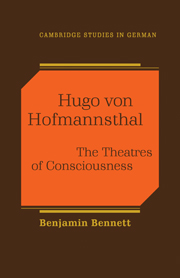Book contents
- Frontmatter
- Contents
- Preface
- Acknowledgments
- List of Abbreviations
- Part I Principles of lyric and drama
- 1 Kleist's puppets
- 2 Language as poetry
- 3 The smallest world theater
- 4 Death and the fools
- 5 Idea, reality and play-acting in Der Tor und der Tod
- 6 Theatrical philosophy: from Der Tor und der Tod to Theater in Versen
- Part II Language and society
- Part III Culture and collapse
- Conclusion
- Notes
- Index of works
- General index
3 - The smallest world theater
Published online by Cambridge University Press: 04 August 2010
- Frontmatter
- Contents
- Preface
- Acknowledgments
- List of Abbreviations
- Part I Principles of lyric and drama
- 1 Kleist's puppets
- 2 Language as poetry
- 3 The smallest world theater
- 4 Death and the fools
- 5 Idea, reality and play-acting in Der Tor und der Tod
- 6 Theatrical philosophy: from Der Tor und der Tod to Theater in Versen
- Part II Language and society
- Part III Culture and collapse
- Conclusion
- Notes
- Index of works
- General index
Summary
I will try to round off my argument on Hofmannsthal's lyric by correlating its metaphysical, linguistic and social aspects in the discussion of a single short text. The main theoretical question I will raise is that of the mysterious moment of silence before a poem's speaking begins. My point is that for Hofmannsthal the idea of the poem as a piece of writing is not inconsistent with the idea of its unfolding as a kind of drama, and that this combination of qualities creates problems that then reverberate in the theory of drama itself.
With reference to my argument concerning Hofmannsthal's refusal to attempt a transcendence of conceptual language, the reader may be tempted to quote from “Poesie und Leben,” a text I used in support of that argument:
There is no path leading from poetry into life or from life into poetry. The word as bearer of a life-content and the corresponding dreamlike word [das traumhafte Bruderwort] that can be used in a poem strain apart from each other and swing past each other unheeding, like the two buckets in a well … The immediate relation to life is excluded from art not by any law but by simple impossibility: these heavy things [of “life”] cannot live in art any more than a cow can live in the treetops.
(P1 263–4)- Type
- Chapter
- Information
- Hugo von HofmannsthalThe Theaters of Consciousness, pp. 34 - 48Publisher: Cambridge University PressPrint publication year: 1988



